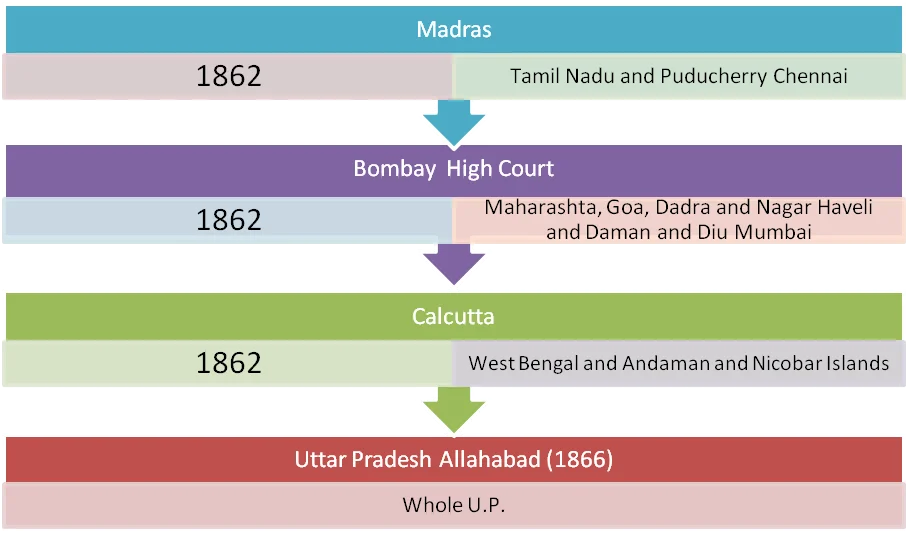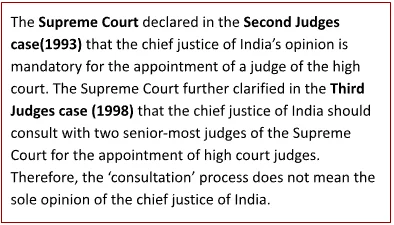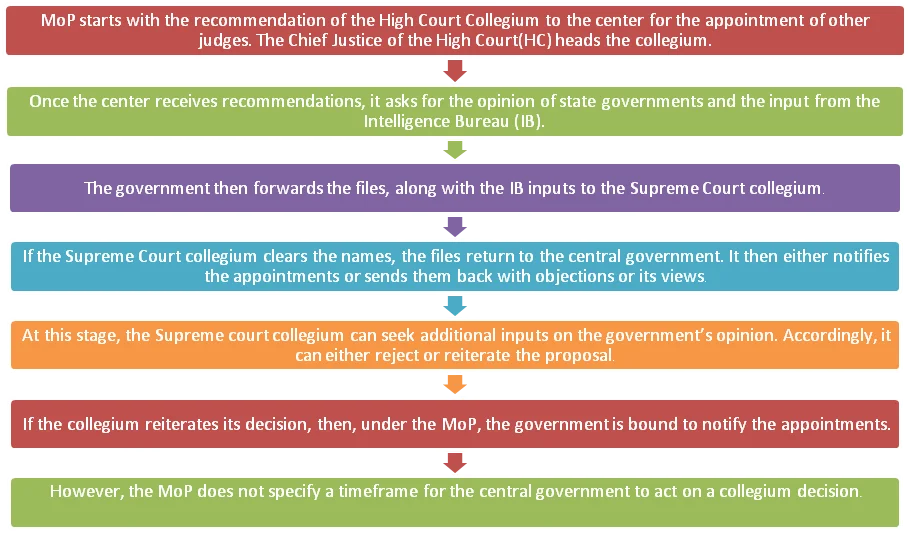In India, High Courts function as the highest courts at the state level, positioned below the Supreme Court and above subordinate courts like District Courts. Established originally in 1862, these courts ensure justice at the state level, operating under the authority of the Indian Constitution. Each state has its High Court, and sometimes, a single High Court serves multiple states or union territories.
The High Court System in India
Background
- Origin and Establishment of High Courts in India: The High Court system originated in India in 1862 by the Indian High Court Act, of 1861, and set up High Courts at Calcutta, Bombay and Madras.
- Further, in 1866, a fourth High Court was established at Allahabad.
- Later with due course of time, each province in British India came to have its own High Court .

- High Courts After Independence: After Independence, the High Court which existed in a province became the High Court for the corresponding state.
- Constitutional Provision for Common High Courts: The Indian Constitution provides for a High Court for each state, but after the Seventh Amendment Act of 1956 it authorised the Parliament to establish a common High Court for two or more states or for two or more states and a union territory.
- Territorial Jurisdiction of High Courts: The territorial jurisdiction of a High Court is co-terminus with the territory of a concerned state.
- Also, if it has a common High Court then it is co-terminus with the territories of the concerned states and union territory.
Enroll now for UPSC Online Course
Constitutional Provisions
- Constitutional Provisions Governing High Courts: Articles 214 to 231 in Part VI of the Constitution deal with the organisation, independence, jurisdiction, powers, procedures, and so on of the High Courts.
- Article 214: It states that there shall be a High Court for each State.
- However, at present (2023) there are 25 High Courts in the country.
- Out of that, only three High Courts have jurisdiction over more than one state.
- Article 231: The Parliament is authorised to establish a common High Court for two or more States.
- This provision was added to the Constitution through the 7th Amendment Act of 1956.
- Article 230: It states for the extension of the jurisdiction of the High Court to certain union territories.
- Among the nine union territories, Delhi alone has a separate High Court (since 1966) and other union territories such as Jammu and Kashmir and Ladakh have a common High Court .
- Rest of other union territories fall under the jurisdiction of different state High Courts.
- Among the nine union territories, Delhi alone has a separate High Court (since 1966) and other union territories such as Jammu and Kashmir and Ladakh have a common High Court .
- Article 215: Every High Court shall be a court of record and shall have all the powers of such a court, including the power to punish for contempt of itself.
- Article 216: Every High Court shall consist of a Chief Justice and such other Judges as the President may from time to time deem fit and necessary for appointing.
- Article 214: It states that there shall be a High Court for each State.
- Extension and Exclusion of Jurisdiction: The Parliament can extend the jurisdiction of a High Court to any union territory or exclude the jurisdiction of a High Court from any union territory.
Composition and Appointment
- Every High Court consists of a Chief Justice and such other judges as the President seems necessary from time to time to appoint.
- The Constitution does not specify the strength of a High Court and leaves it to the discretion of the President.
- Therefore, the President determines the strength of a High Court from time to time depending upon its requirement.
Appointment and Conditions of Judges (Article 217)
- Appointment Authority: Every Judge of a High Court shall be appointed by the President by warrant under his hand and seal.
- Consultation Requirement: The President must consult the Chief Justice of India, the Governor of the State, and, in the case of appointing a Judge other than the Chief Justice, the Chief Justice of the High Court.
- Tenure of Judges: Judges shall hold office, in the case of an additional or acting Judge, as provided in Article 224, and in any other case, until they attain the age of sixty-two years.

Appointment System of High Court Judges

Qualifications, Oath and Salaries
Qualification of Judges
- Qualification Criteria: Article 217 (2): A person shall not be qualified for appointment as a Judge of a High Court unless he is a citizen of India and –
- has for at least ten years held a judicial office in the territory of India; or
- has for at least ten years been an advocate of a High Court or of two or more such Courts in succession.
- Determining Age: If any question arises as to the age of a Judge of a High Court, the question shall be decided by the President after consultation with the Chief Justice of India and the decision of the President shall be final.
Oath or Affirmation
- Oath or Affirmation Requirement: Article 219: Every person appointed to be a Judge of a High Court shall, before he enters upon his office, make and subscribe before the Governor of the State, or some person appointed in that behalf by him, an oath or affirmation according to the form set out for the purpose in the Third Schedule.
- Content of the Oath: In his oath, a judge of the High Court swears:
- To bear true faith and allegiance to the Constitution of India;
- To uphold the sovereignty and integrity of India;
- To duly and faithfully and to the best of his ability, knowledge and judgement perform the duties of the office without fear or favour, affection or ill-will and
- To uphold the Constitution and the laws.
Salaries and Allowance
- Article 221:
-
- Salary Determination (1) : There shall be paid to the Judges of each High Court such salaries as may be determined by Parliament by law and, until provision in that behalf is so made, such salaries as are specified in the Second Schedule.
- Entitlement to Allowances and Rights (2): Every Judge shall be entitled to such allowances and to such rights in respect of leave of absence and pension as may from time to time be determined by or under law made by Parliament and, until so determined, to such allowances and rights as are specified in the Second Schedule:
- Protection of Allowances and Rights: Provided that neither the allowances of a Judge nor his rights in respect of leave of absence shall be varied to his disadvantage after his appointment.
Enroll now for UPSC Online Course
| Must Read | |
| Current Affairs | Editorial Analysis |
| Upsc Notes | Upsc Blogs |
| NCERT Notes | Free Main Answer Writing |
Conclusion
In conclusion, the High Court serves as a crucial judicial authority, with powers defined by the Constitution of India.
- Its judges are appointed based on specific qualifications, ensuring competent and fair adjudication. By maintaining the integrity of the legal system, the High Courts contribute significantly to democracy and justice in India.
- Their existence reflects the commitment to uphold the rule of law and protect the rights of individuals in the nation.
Sign up for the PWOnlyIAS Online Course by Physics Wallah and start your journey to IAS success today!
| Related Articles | |
| concept of the rule of law | High Courts in India |
| Governors in India’s State Governments | Features of Indian Constitution |

 GS Foundation
GS Foundation Optional Course
Optional Course Combo Courses
Combo Courses Degree Program
Degree Program










